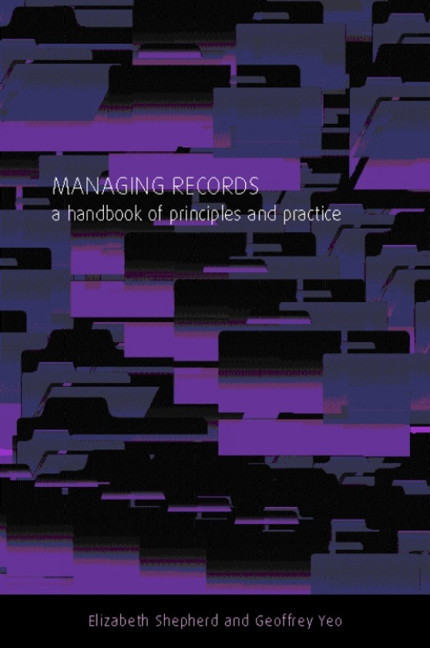Book contents
- Frontmatter
- Contents
- Preface
- Editorial note
- Introduction
- 1 Understanding records management
- 2 Analysing the context for records management
- 3 Classifying records and documenting their context
- 4 Creating and capturing records
- 5 Managing appraisal, retention and disposition
- 6 Maintaining records and assuring their integrity
- 7 Providing access
- 8 Implementing records management: practical and managerial issues
- Conclusion
- Appendix A Bibliography and sources of further information
- Appendix B Select list of national and international standards
- Appendix C Professional organizations for records managers in English-speaking countries
- Index
Introduction
Published online by Cambridge University Press: 09 June 2018
- Frontmatter
- Contents
- Preface
- Editorial note
- Introduction
- 1 Understanding records management
- 2 Analysing the context for records management
- 3 Classifying records and documenting their context
- 4 Creating and capturing records
- 5 Managing appraisal, retention and disposition
- 6 Maintaining records and assuring their integrity
- 7 Providing access
- 8 Implementing records management: practical and managerial issues
- Conclusion
- Appendix A Bibliography and sources of further information
- Appendix B Select list of national and international standards
- Appendix C Professional organizations for records managers in English-speaking countries
- Index
Summary
Why keep records?
Every organization needs records.
Organizations use records in the conduct of current business, to enable decisions to be made and actions taken. Records may be required for business purposes whenever there is a need to recall or prove what was done or decided in the past. Records provide access to precedents or previous work and thus save time and money by eliminating the need to create resources afresh. Records are also kept to guard against fraud and to enable organizations to protect their rights and assets at law.
Organizations also use records to support accountability, when they need to prove that they have met their obligations or complied with best practice. Organizations are accountable in many ways: they must meet legal, regulatory and fiscal requirements, and undergo audits and inspections of various kinds; and they must be able to provide explanations for decisions made or actions taken. The use of records is the primary means by which organizations can defend their actions if they are called to account for their conduct.
Such external accountability is particularly important to public sector bodies, which are responsible for their actions both to governments and to the wider public. Companies are responsible to their shareholders, besides having a level of responsibility to the wider community. Every organization is liable to be called to account by legislators, regulators or auditors. Organizations use their records to respond to challenges made against them, whether in a court of law or elsewhere, and to justify their actions and decisions in response to enquiries or in the public arena. Within the organization, records support internal accountability. Those working at lower levels are responsible to their seniors for the work they perform, and records are used to prove or assess performance.
While records are created in the first instance for the conduct of business and to support accountability, organizations may also use them for cultural purposes, both for research and to promote awareness and understanding of corporate history. Figure 0.1 illustrates these three broad reasons for keeping records.
Outside the organization, the wider community also has expectations that records should be kept. When records are used for purposes of accountability they are not merely supporting organizational needs for compliance or self-defence; they also meet the requirements of society for transparency and the protection of rights.
- Type
- Chapter
- Information
- Managing Recordsa handbook of principles and practice, pp. xi - xivPublisher: FacetPrint publication year: 2003

